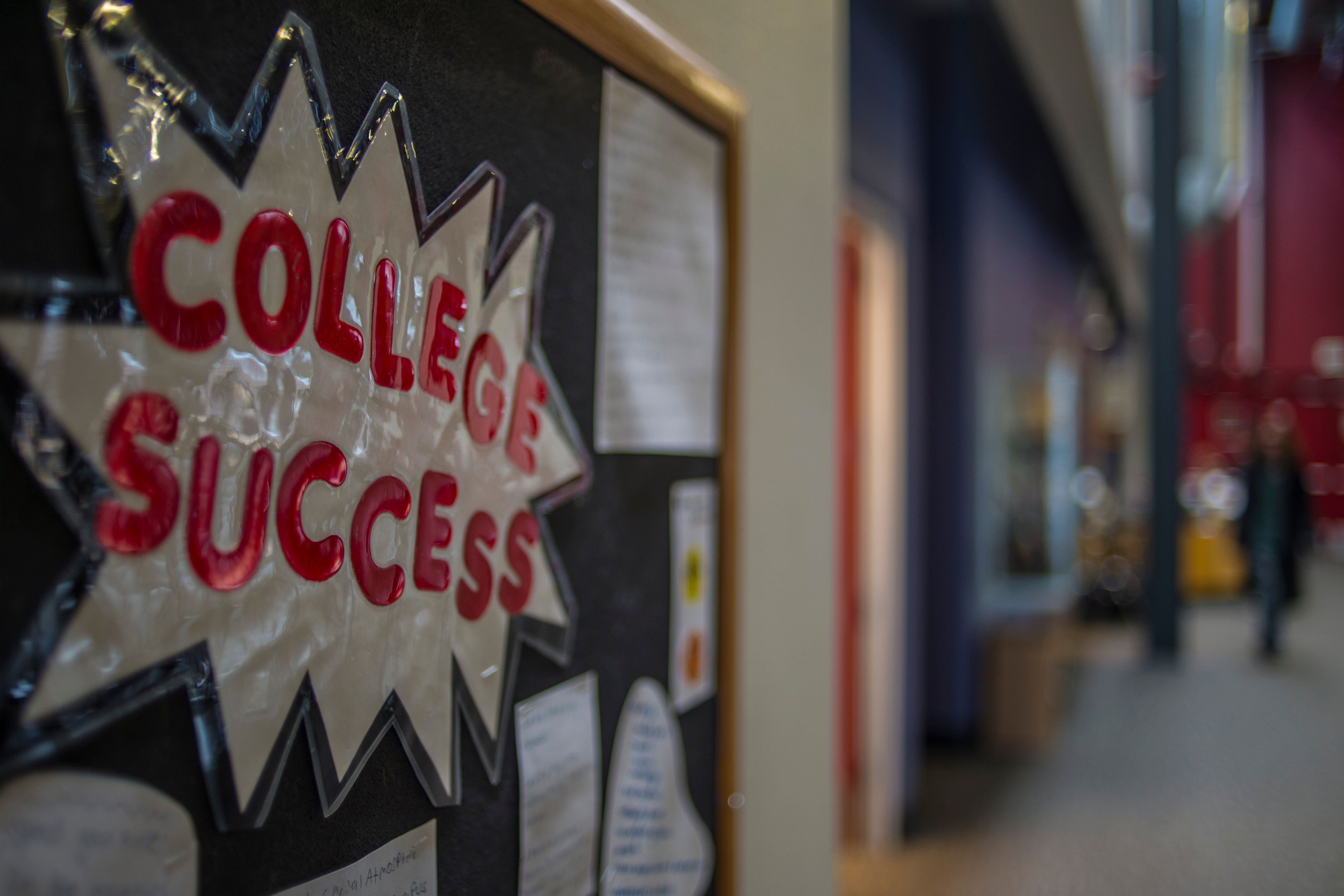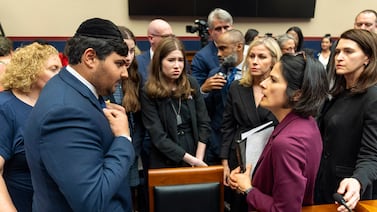Sign up for Chalkbeat New York’s free daily newsletter to keep up with NYC’s public schools.
T’Kai Harvey, a sophomore at the City University of New York’s Hunter College, didn’t see college as an option for most of her life.
“I come from a very low-income community in the Bronx,” she said. “So I wasn’t going to go to college and financially burden my family.”
But in her senior year of high school, Harvey learned about the Free Application for Federal Student Aid, or FAFSA, through her school, working with a counselor at her school who helped her complete the forms and secure the financial support she needed to fund her education.
Now, Harvey, along with other advocates and some lawmakers, is calling for a “universal FAFSA” law requiring all high school students to complete a financial aid application or submit a waiver opting out by the time they graduate.
The push has gained some traction in Albany, where a proposed law seeking to establish the requirement could be included in the state budget expected later this week. Gov. Kathy Hochul included a universal FAFSA policy in her budget proposal earlier this year, and on Monday, Hochul announced her administration would send letters to high school seniors with tips on completing the FAFSA, while urging principals to ensure students have the resources they need to access financial aid.
But some school districts have expressed concerns about taking on the added responsibility without additional resources, complicating the ongoing negotiations.
To Harvey, the proposed law is critical because she saw peers at other schools who were never informed about the FAFSA and missed out on significant financial aid as a result.
“I know I could have been one of the kids that didn’t have the opportunity to go to college, had I not been told,” said Harvey, a student advocate with uAspire, an organization that advocates for college access for students from underrepresented communities. “There’s a lot of federal aid that gets left behind because students aren’t filling it out.”
Calls for Universal FAFSA in New York follow the adoption of the policy in several other states. They come as recent data has shown local students losing out significant federal funding and as the fumbled rollout of a new version of the federal form this year has spurred headaches for students and counselors across the country.
In 2023, graduating students missed out on more than $225 million in potential Pell Grants by not completing the FAFSA, according to an analysis by the National College Attainment Network. And studies have shown students who complete the FAFSA are far more likely to attend college.
“So many students don’t even fill out the FAFSA, and as a result, they don’t even consider the possibility of pursuing higher education, because they think it’s out of reach,” said state Sen. Andrew Gounardes, a sponsor of the bill. “The data that we saw in NY: Leaving $200 million on the table in eligible financial aid grants … That is a staggering number.”
Financial aid forms can be confusing for families
Under language put forward in a bill earlier this year by Gounardes and Assembly Member Jonathan Jacobson, New York would require all public, charter, and private schools to enact “a universal financial aid policy,” meaning all students would be mandated to submit a FAFSA or Tuition Assistance Program, or TAP, application during their senior year. Students would also be able to submit a waiver opting out. (Those who do not complete an application or opt out would not be prevented from graduating.)
Proponents of a universal FAFSA law note that students can encounter barriers to filling out the complex financial aid forms, especially for those whose parents aren’t able to help.
“Many first-generation college students are navigating the financial aid process on their own,” said Anika Van Eaton, vice president of policy at uAspire. “Embedding this key step towards pursuing college and gaining knowledge of one’s financial aid eligibility within the high school experience is so crucial.”
Jacobson, the Assembly sponsor, noted many households haven’t encountered forms like the financial aid applications before.
“FAFSA is difficult — it’s difficult even if you’re a CPA,” he said. “There’s no question that students need help in doing this.”
For Melody Garcia, a senior at Hunter College who graduated from a public high school in Queens, their first experience filling out the form was difficult. Questions about assets, income, and other aspects of their financial situation quickly became confusing to Garcia and their mother, who does not have a college degree.
“There are so many different things that you need to fill out,” said Garcia, who uses they/them pronouns. “It looks like you’re doing taxes, and I just didn’t understand that.”
Garcia was able to get help from counselors at South Asian Youth Action, a community organization that works with schools in Queens and Brooklyn. But without that support, they would have felt lost, they said.
Still, Garcia is hopeful that a universal FAFSA policy would mean more students could find help at school.
“If it was mandatory, schools would have to set aside time for this, and really make sure that students know where to go,” said Garcia, who is an advocate with Young Invincibles, an organization that works to amplify youth voices and has called for New York to adopt a universal FAFSA policy.
Some schools concerned about FAFSA law
Some school districts worry, however, the bill would create an additional burden for them, particularly if it comes without any funding or other support. It’s become one of several issues that lawmakers and Hochul continue to discuss as negotiations over the state budget persist.
Bob Lowry, deputy director for the state’s Council of School Superintendents, said while they have supported voluntary efforts to encourage FAFSA completion, they remained concerned over the specifics of the potential new law.
Proposals from the Senate and Hochul would require school districts to obtain documentation from families that students had completed their financial aid applications or opted out — an added task for schools. Some school districts are also concerned about requirements to notify high school seniors about financial aid applications at least four times during the school year, as well as having to provide access or referrals for additional support in completing the FAFSA.
“Our greatest concern is with the potential expectation that schools will have the capacity to assist students and families with FAFSA completion,” Lowry said in an email.
Lowry instead favored language included in the Assembly’s budget proposal last month that does not make FAFSA completion a requirement, but directs the state to develop additional resources for students, including compiling lists of organizations that offer assistance with the FAFSA. Schools would be required to distribute those resources and conduct an annual presentation to students.
Gounardes said the goal is not to “take a prescriptive approach,” letting school districts determine how to approach the forms with their students.
“A lot of the other states that have done this have not required significant infusion of additional resources,” he added. “Though we are certainly very open to that conversation, were it demonstrated to be a necessity.”
Current FAFSA problems highlight bill’s need, lawmaker says
Gounardes believes the need for the proposed law has been heightened by nationwide issues with the FAFSA this year.
The “Better FAFSA” was intended to simplify the process through which students receive financial aid. But rollout of the new form has been plagued by glitches and errors, stoking fears that a significant portion of the Class of 2024 could ultimately end up not attending college.
Though Gounardes believes the issues will be solved for future application cycles, he added the impact of this year’s problems could be far-reaching.
“This debacle is proof as to why universal FAFSA is so important,” Gounardes said. “How many students are going to hear or assume that because it was a disaster this year, ‘Oh it’s not worth my time anymore. I’m not even going to bother.’
“That could not be further from the truth,” he said.
And while the city’s Education Department did not comment on the proposed law, it emphasized its commitment to ensuring students had adequate postsecondary support — particularly in light of issues this year.
“While there is continued concern about the impact of this year’s FAFSA difficulties, we have bolstered our support for students completing FAFSA,” Education Department spokesperson Chyann Tull said in a statement.
This year, the city has provided additional training to counselors, hosted remote advising sessions for families, partnered with organizations on FAFSA completion events, and distributed multilingual FAFSA guides, Tull said.
Julian Shen-Berro is a reporter covering New York City. Contact him at jshen-berro@chalkbeat.org.






